Energy Transition: Challenges of Moving Away from Fossil Fuels
VerifiedAdded on 2023/06/10
|9
|2926
|62
Essay
AI Summary
This essay critically assesses the primary challenges associated with the energy transition away from fossil fuels. It highlights policy and regulation, technological hurdles, financial constraints, network issues, and market share impacts as key obstacles. The discussion covers the necessity of government support, technological advancements, and financial investments to encourage the shift towards renewable energy. The essay also addresses the importance of adapting business models and integrating energy systems to meet regulatory requirements and customer preferences. It emphasizes that different nations face unique challenges based on their existing energy mix, economic development, and carbon emissions, suggesting that a diversified approach is essential for a successful energy transition. This resource is available on Desklib, a platform offering study tools and solved assignments for students.
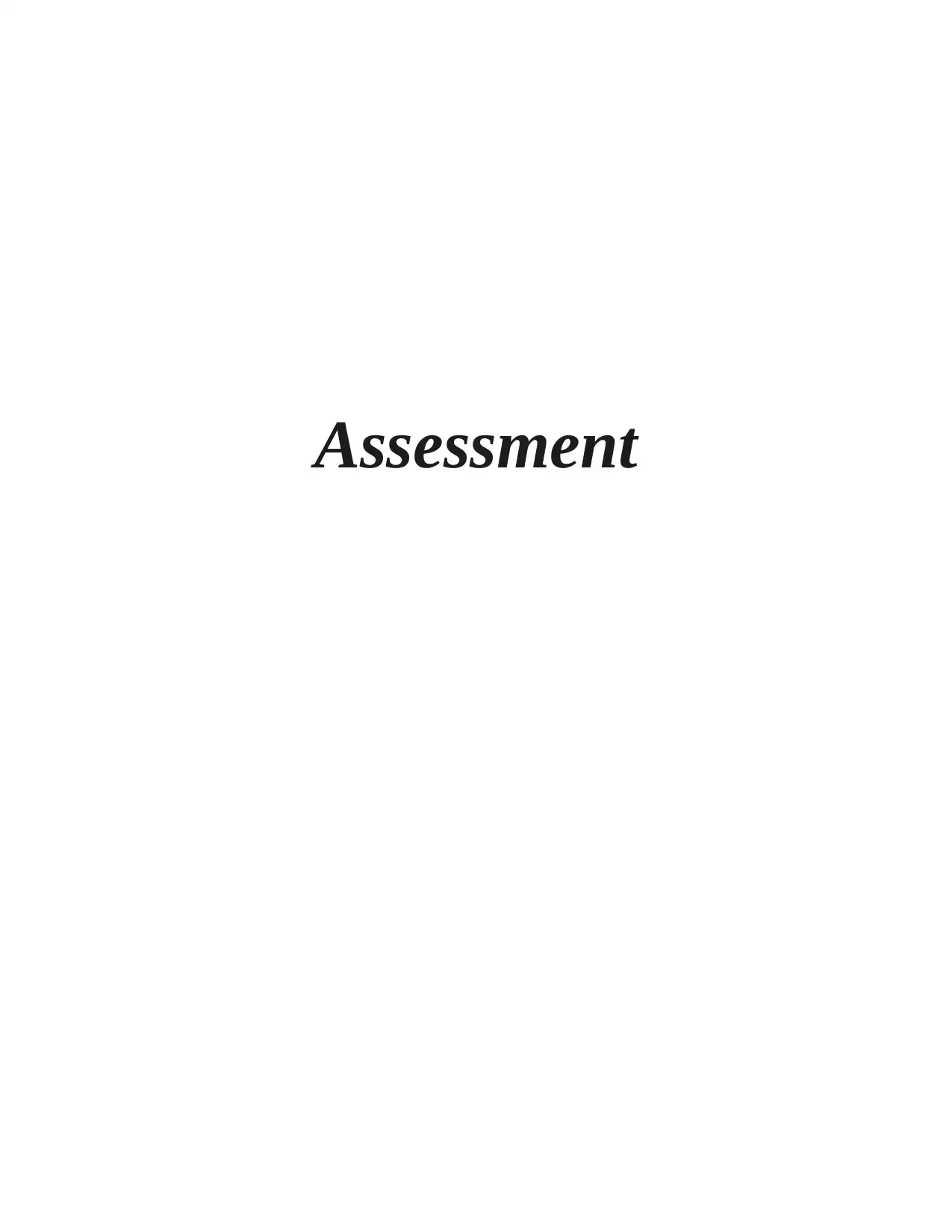
Assessment
Paraphrase This Document
Need a fresh take? Get an instant paraphrase of this document with our AI Paraphraser

Table of Contents
INTRODUCTION...........................................................................................................................3
MAIN BODY...................................................................................................................................3
CONCLUSION ...............................................................................................................................8
REFERENCES................................................................................................................................9
INTRODUCTION...........................................................................................................................3
MAIN BODY...................................................................................................................................3
CONCLUSION ...............................................................................................................................8
REFERENCES................................................................................................................................9
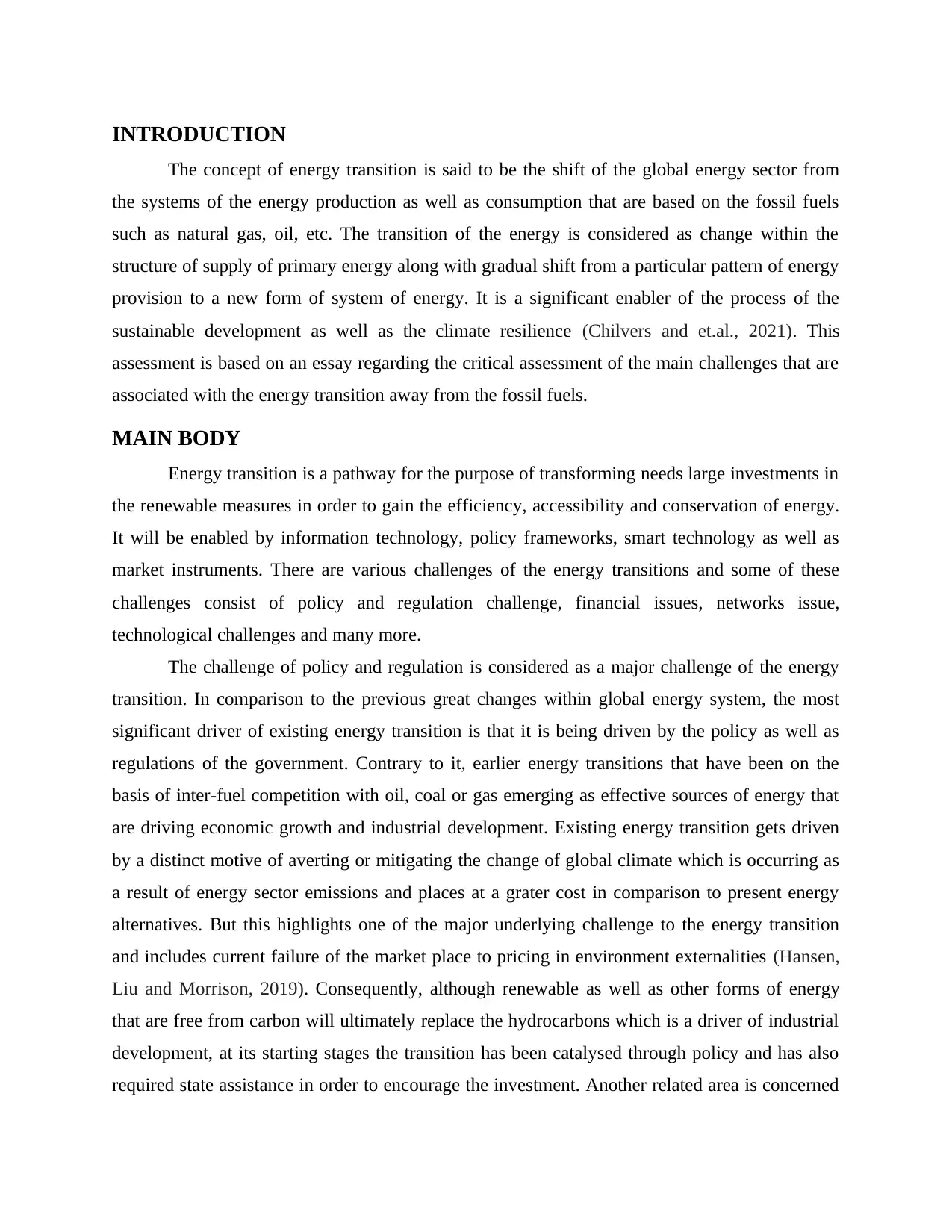
INTRODUCTION
The concept of energy transition is said to be the shift of the global energy sector from
the systems of the energy production as well as consumption that are based on the fossil fuels
such as natural gas, oil, etc. The transition of the energy is considered as change within the
structure of supply of primary energy along with gradual shift from a particular pattern of energy
provision to a new form of system of energy. It is a significant enabler of the process of the
sustainable development as well as the climate resilience (Chilvers and et.al., 2021). This
assessment is based on an essay regarding the critical assessment of the main challenges that are
associated with the energy transition away from the fossil fuels.
MAIN BODY
Energy transition is a pathway for the purpose of transforming needs large investments in
the renewable measures in order to gain the efficiency, accessibility and conservation of energy.
It will be enabled by information technology, policy frameworks, smart technology as well as
market instruments. There are various challenges of the energy transitions and some of these
challenges consist of policy and regulation challenge, financial issues, networks issue,
technological challenges and many more.
The challenge of policy and regulation is considered as a major challenge of the energy
transition. In comparison to the previous great changes within global energy system, the most
significant driver of existing energy transition is that it is being driven by the policy as well as
regulations of the government. Contrary to it, earlier energy transitions that have been on the
basis of inter-fuel competition with oil, coal or gas emerging as effective sources of energy that
are driving economic growth and industrial development. Existing energy transition gets driven
by a distinct motive of averting or mitigating the change of global climate which is occurring as
a result of energy sector emissions and places at a grater cost in comparison to present energy
alternatives. But this highlights one of the major underlying challenge to the energy transition
and includes current failure of the market place to pricing in environment externalities (Hansen,
Liu and Morrison, 2019). Consequently, although renewable as well as other forms of energy
that are free from carbon will ultimately replace the hydrocarbons which is a driver of industrial
development, at its starting stages the transition has been catalysed through policy and has also
required state assistance in order to encourage the investment. Another related area is concerned
The concept of energy transition is said to be the shift of the global energy sector from
the systems of the energy production as well as consumption that are based on the fossil fuels
such as natural gas, oil, etc. The transition of the energy is considered as change within the
structure of supply of primary energy along with gradual shift from a particular pattern of energy
provision to a new form of system of energy. It is a significant enabler of the process of the
sustainable development as well as the climate resilience (Chilvers and et.al., 2021). This
assessment is based on an essay regarding the critical assessment of the main challenges that are
associated with the energy transition away from the fossil fuels.
MAIN BODY
Energy transition is a pathway for the purpose of transforming needs large investments in
the renewable measures in order to gain the efficiency, accessibility and conservation of energy.
It will be enabled by information technology, policy frameworks, smart technology as well as
market instruments. There are various challenges of the energy transitions and some of these
challenges consist of policy and regulation challenge, financial issues, networks issue,
technological challenges and many more.
The challenge of policy and regulation is considered as a major challenge of the energy
transition. In comparison to the previous great changes within global energy system, the most
significant driver of existing energy transition is that it is being driven by the policy as well as
regulations of the government. Contrary to it, earlier energy transitions that have been on the
basis of inter-fuel competition with oil, coal or gas emerging as effective sources of energy that
are driving economic growth and industrial development. Existing energy transition gets driven
by a distinct motive of averting or mitigating the change of global climate which is occurring as
a result of energy sector emissions and places at a grater cost in comparison to present energy
alternatives. But this highlights one of the major underlying challenge to the energy transition
and includes current failure of the market place to pricing in environment externalities (Hansen,
Liu and Morrison, 2019). Consequently, although renewable as well as other forms of energy
that are free from carbon will ultimately replace the hydrocarbons which is a driver of industrial
development, at its starting stages the transition has been catalysed through policy and has also
required state assistance in order to encourage the investment. Another related area is concerned
⊘ This is a preview!⊘
Do you want full access?
Subscribe today to unlock all pages.

Trusted by 1+ million students worldwide
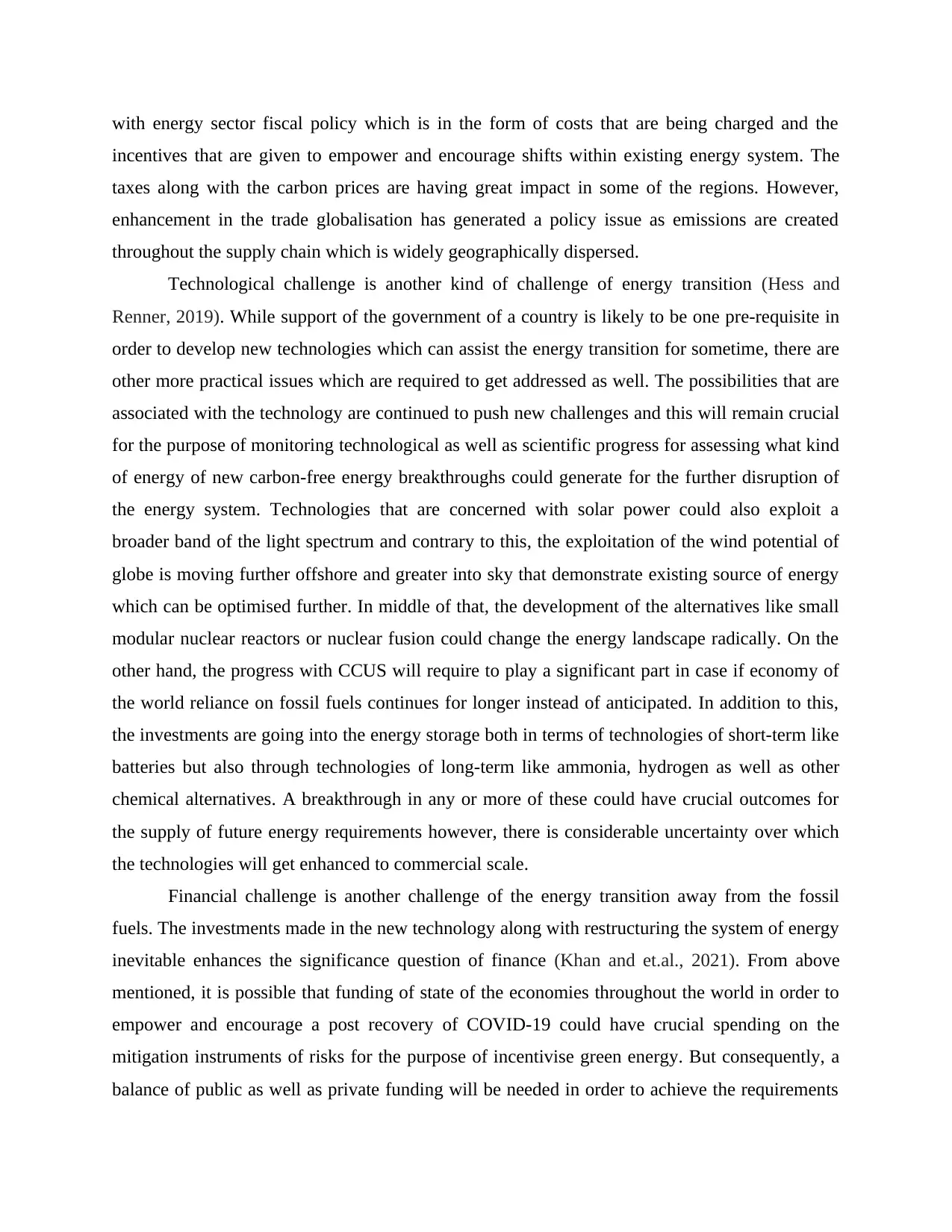
with energy sector fiscal policy which is in the form of costs that are being charged and the
incentives that are given to empower and encourage shifts within existing energy system. The
taxes along with the carbon prices are having great impact in some of the regions. However,
enhancement in the trade globalisation has generated a policy issue as emissions are created
throughout the supply chain which is widely geographically dispersed.
Technological challenge is another kind of challenge of energy transition (Hess and
Renner, 2019). While support of the government of a country is likely to be one pre-requisite in
order to develop new technologies which can assist the energy transition for sometime, there are
other more practical issues which are required to get addressed as well. The possibilities that are
associated with the technology are continued to push new challenges and this will remain crucial
for the purpose of monitoring technological as well as scientific progress for assessing what kind
of energy of new carbon-free energy breakthroughs could generate for the further disruption of
the energy system. Technologies that are concerned with solar power could also exploit a
broader band of the light spectrum and contrary to this, the exploitation of the wind potential of
globe is moving further offshore and greater into sky that demonstrate existing source of energy
which can be optimised further. In middle of that, the development of the alternatives like small
modular nuclear reactors or nuclear fusion could change the energy landscape radically. On the
other hand, the progress with CCUS will require to play a significant part in case if economy of
the world reliance on fossil fuels continues for longer instead of anticipated. In addition to this,
the investments are going into the energy storage both in terms of technologies of short-term like
batteries but also through technologies of long-term like ammonia, hydrogen as well as other
chemical alternatives. A breakthrough in any or more of these could have crucial outcomes for
the supply of future energy requirements however, there is considerable uncertainty over which
the technologies will get enhanced to commercial scale.
Financial challenge is another challenge of the energy transition away from the fossil
fuels. The investments made in the new technology along with restructuring the system of energy
inevitable enhances the significance question of finance (Khan and et.al., 2021). From above
mentioned, it is possible that funding of state of the economies throughout the world in order to
empower and encourage a post recovery of COVID-19 could have crucial spending on the
mitigation instruments of risks for the purpose of incentivise green energy. But consequently, a
balance of public as well as private funding will be needed in order to achieve the requirements
incentives that are given to empower and encourage shifts within existing energy system. The
taxes along with the carbon prices are having great impact in some of the regions. However,
enhancement in the trade globalisation has generated a policy issue as emissions are created
throughout the supply chain which is widely geographically dispersed.
Technological challenge is another kind of challenge of energy transition (Hess and
Renner, 2019). While support of the government of a country is likely to be one pre-requisite in
order to develop new technologies which can assist the energy transition for sometime, there are
other more practical issues which are required to get addressed as well. The possibilities that are
associated with the technology are continued to push new challenges and this will remain crucial
for the purpose of monitoring technological as well as scientific progress for assessing what kind
of energy of new carbon-free energy breakthroughs could generate for the further disruption of
the energy system. Technologies that are concerned with solar power could also exploit a
broader band of the light spectrum and contrary to this, the exploitation of the wind potential of
globe is moving further offshore and greater into sky that demonstrate existing source of energy
which can be optimised further. In middle of that, the development of the alternatives like small
modular nuclear reactors or nuclear fusion could change the energy landscape radically. On the
other hand, the progress with CCUS will require to play a significant part in case if economy of
the world reliance on fossil fuels continues for longer instead of anticipated. In addition to this,
the investments are going into the energy storage both in terms of technologies of short-term like
batteries but also through technologies of long-term like ammonia, hydrogen as well as other
chemical alternatives. A breakthrough in any or more of these could have crucial outcomes for
the supply of future energy requirements however, there is considerable uncertainty over which
the technologies will get enhanced to commercial scale.
Financial challenge is another challenge of the energy transition away from the fossil
fuels. The investments made in the new technology along with restructuring the system of energy
inevitable enhances the significance question of finance (Khan and et.al., 2021). From above
mentioned, it is possible that funding of state of the economies throughout the world in order to
empower and encourage a post recovery of COVID-19 could have crucial spending on the
mitigation instruments of risks for the purpose of incentivise green energy. But consequently, a
balance of public as well as private funding will be needed in order to achieve the requirements
Paraphrase This Document
Need a fresh take? Get an instant paraphrase of this document with our AI Paraphraser
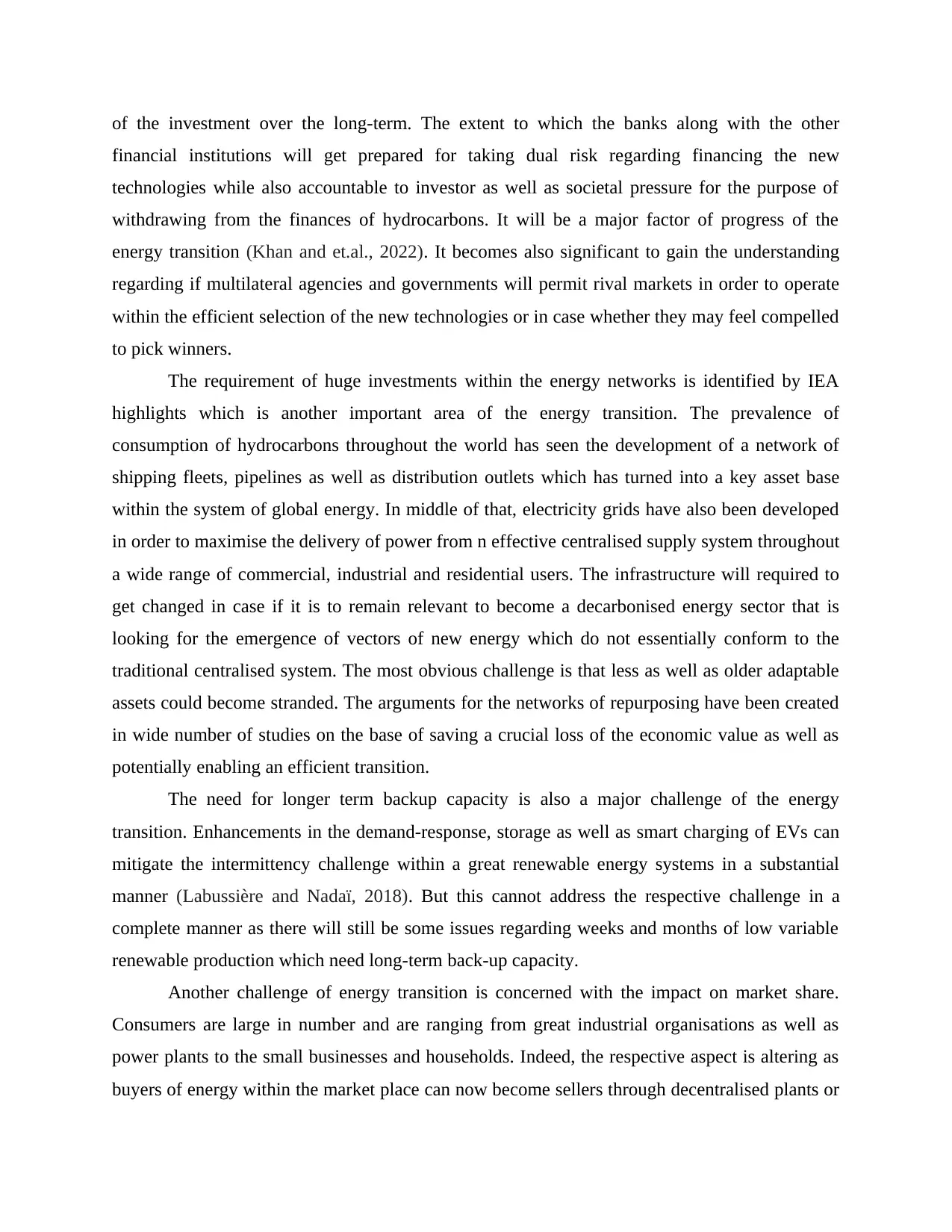
of the investment over the long-term. The extent to which the banks along with the other
financial institutions will get prepared for taking dual risk regarding financing the new
technologies while also accountable to investor as well as societal pressure for the purpose of
withdrawing from the finances of hydrocarbons. It will be a major factor of progress of the
energy transition (Khan and et.al., 2022). It becomes also significant to gain the understanding
regarding if multilateral agencies and governments will permit rival markets in order to operate
within the efficient selection of the new technologies or in case whether they may feel compelled
to pick winners.
The requirement of huge investments within the energy networks is identified by IEA
highlights which is another important area of the energy transition. The prevalence of
consumption of hydrocarbons throughout the world has seen the development of a network of
shipping fleets, pipelines as well as distribution outlets which has turned into a key asset base
within the system of global energy. In middle of that, electricity grids have also been developed
in order to maximise the delivery of power from n effective centralised supply system throughout
a wide range of commercial, industrial and residential users. The infrastructure will required to
get changed in case if it is to remain relevant to become a decarbonised energy sector that is
looking for the emergence of vectors of new energy which do not essentially conform to the
traditional centralised system. The most obvious challenge is that less as well as older adaptable
assets could become stranded. The arguments for the networks of repurposing have been created
in wide number of studies on the base of saving a crucial loss of the economic value as well as
potentially enabling an efficient transition.
The need for longer term backup capacity is also a major challenge of the energy
transition. Enhancements in the demand-response, storage as well as smart charging of EVs can
mitigate the intermittency challenge within a great renewable energy systems in a substantial
manner (Labussière and Nadaï, 2018). But this cannot address the respective challenge in a
complete manner as there will still be some issues regarding weeks and months of low variable
renewable production which need long-term back-up capacity.
Another challenge of energy transition is concerned with the impact on market share.
Consumers are large in number and are ranging from great industrial organisations as well as
power plants to the small businesses and households. Indeed, the respective aspect is altering as
buyers of energy within the market place can now become sellers through decentralised plants or
financial institutions will get prepared for taking dual risk regarding financing the new
technologies while also accountable to investor as well as societal pressure for the purpose of
withdrawing from the finances of hydrocarbons. It will be a major factor of progress of the
energy transition (Khan and et.al., 2022). It becomes also significant to gain the understanding
regarding if multilateral agencies and governments will permit rival markets in order to operate
within the efficient selection of the new technologies or in case whether they may feel compelled
to pick winners.
The requirement of huge investments within the energy networks is identified by IEA
highlights which is another important area of the energy transition. The prevalence of
consumption of hydrocarbons throughout the world has seen the development of a network of
shipping fleets, pipelines as well as distribution outlets which has turned into a key asset base
within the system of global energy. In middle of that, electricity grids have also been developed
in order to maximise the delivery of power from n effective centralised supply system throughout
a wide range of commercial, industrial and residential users. The infrastructure will required to
get changed in case if it is to remain relevant to become a decarbonised energy sector that is
looking for the emergence of vectors of new energy which do not essentially conform to the
traditional centralised system. The most obvious challenge is that less as well as older adaptable
assets could become stranded. The arguments for the networks of repurposing have been created
in wide number of studies on the base of saving a crucial loss of the economic value as well as
potentially enabling an efficient transition.
The need for longer term backup capacity is also a major challenge of the energy
transition. Enhancements in the demand-response, storage as well as smart charging of EVs can
mitigate the intermittency challenge within a great renewable energy systems in a substantial
manner (Labussière and Nadaï, 2018). But this cannot address the respective challenge in a
complete manner as there will still be some issues regarding weeks and months of low variable
renewable production which need long-term back-up capacity.
Another challenge of energy transition is concerned with the impact on market share.
Consumers are large in number and are ranging from great industrial organisations as well as
power plants to the small businesses and households. Indeed, the respective aspect is altering as
buyers of energy within the market place can now become sellers through decentralised plants or
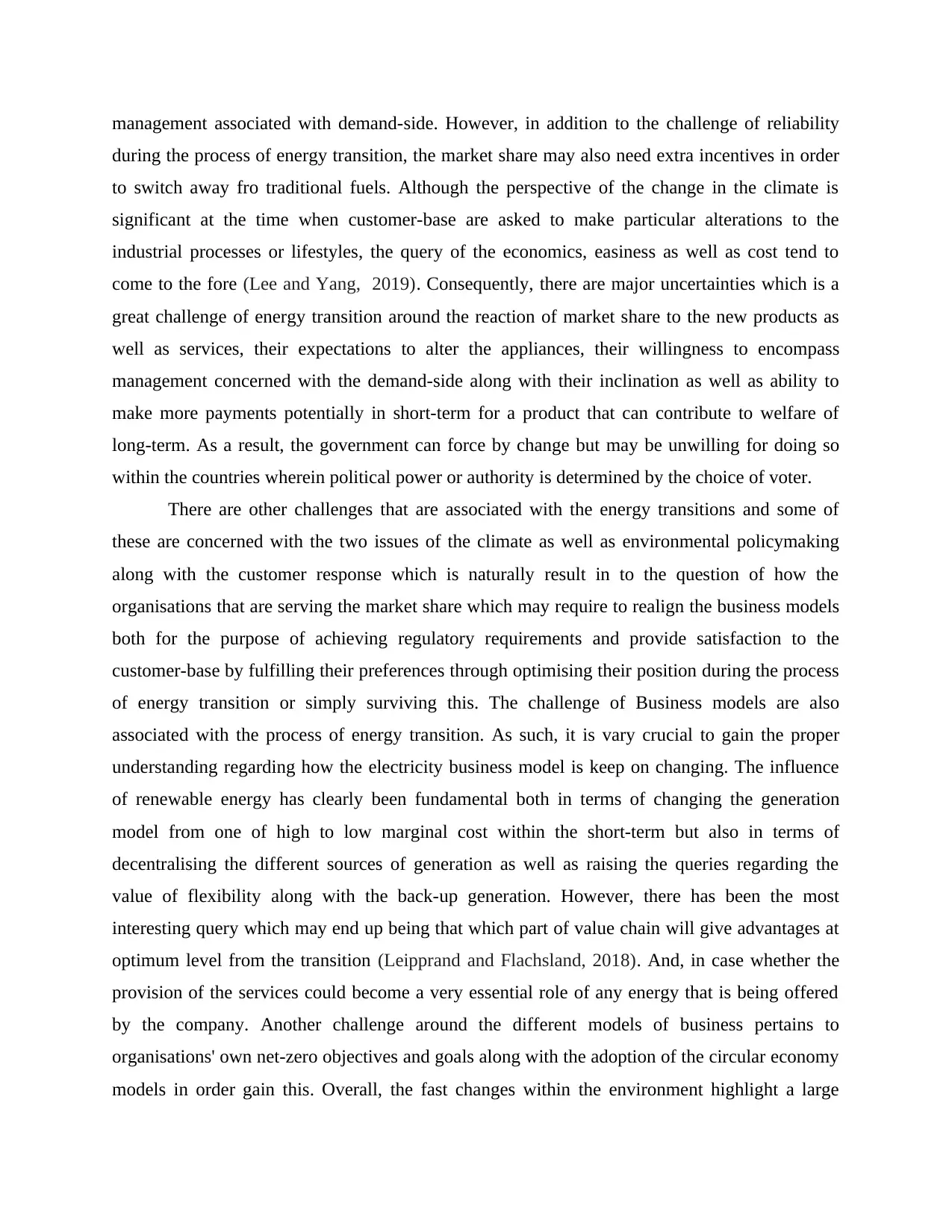
management associated with demand-side. However, in addition to the challenge of reliability
during the process of energy transition, the market share may also need extra incentives in order
to switch away fro traditional fuels. Although the perspective of the change in the climate is
significant at the time when customer-base are asked to make particular alterations to the
industrial processes or lifestyles, the query of the economics, easiness as well as cost tend to
come to the fore (Lee and Yang, 2019). Consequently, there are major uncertainties which is a
great challenge of energy transition around the reaction of market share to the new products as
well as services, their expectations to alter the appliances, their willingness to encompass
management concerned with the demand-side along with their inclination as well as ability to
make more payments potentially in short-term for a product that can contribute to welfare of
long-term. As a result, the government can force by change but may be unwilling for doing so
within the countries wherein political power or authority is determined by the choice of voter.
There are other challenges that are associated with the energy transitions and some of
these are concerned with the two issues of the climate as well as environmental policymaking
along with the customer response which is naturally result in to the question of how the
organisations that are serving the market share which may require to realign the business models
both for the purpose of achieving regulatory requirements and provide satisfaction to the
customer-base by fulfilling their preferences through optimising their position during the process
of energy transition or simply surviving this. The challenge of Business models are also
associated with the process of energy transition. As such, it is vary crucial to gain the proper
understanding regarding how the electricity business model is keep on changing. The influence
of renewable energy has clearly been fundamental both in terms of changing the generation
model from one of high to low marginal cost within the short-term but also in terms of
decentralising the different sources of generation as well as raising the queries regarding the
value of flexibility along with the back-up generation. However, there has been the most
interesting query which may end up being that which part of value chain will give advantages at
optimum level from the transition (Leipprand and Flachsland, 2018). And, in case whether the
provision of the services could become a very essential role of any energy that is being offered
by the company. Another challenge around the different models of business pertains to
organisations' own net-zero objectives and goals along with the adoption of the circular economy
models in order gain this. Overall, the fast changes within the environment highlight a large
during the process of energy transition, the market share may also need extra incentives in order
to switch away fro traditional fuels. Although the perspective of the change in the climate is
significant at the time when customer-base are asked to make particular alterations to the
industrial processes or lifestyles, the query of the economics, easiness as well as cost tend to
come to the fore (Lee and Yang, 2019). Consequently, there are major uncertainties which is a
great challenge of energy transition around the reaction of market share to the new products as
well as services, their expectations to alter the appliances, their willingness to encompass
management concerned with the demand-side along with their inclination as well as ability to
make more payments potentially in short-term for a product that can contribute to welfare of
long-term. As a result, the government can force by change but may be unwilling for doing so
within the countries wherein political power or authority is determined by the choice of voter.
There are other challenges that are associated with the energy transitions and some of
these are concerned with the two issues of the climate as well as environmental policymaking
along with the customer response which is naturally result in to the question of how the
organisations that are serving the market share which may require to realign the business models
both for the purpose of achieving regulatory requirements and provide satisfaction to the
customer-base by fulfilling their preferences through optimising their position during the process
of energy transition or simply surviving this. The challenge of Business models are also
associated with the process of energy transition. As such, it is vary crucial to gain the proper
understanding regarding how the electricity business model is keep on changing. The influence
of renewable energy has clearly been fundamental both in terms of changing the generation
model from one of high to low marginal cost within the short-term but also in terms of
decentralising the different sources of generation as well as raising the queries regarding the
value of flexibility along with the back-up generation. However, there has been the most
interesting query which may end up being that which part of value chain will give advantages at
optimum level from the transition (Leipprand and Flachsland, 2018). And, in case whether the
provision of the services could become a very essential role of any energy that is being offered
by the company. Another challenge around the different models of business pertains to
organisations' own net-zero objectives and goals along with the adoption of the circular economy
models in order gain this. Overall, the fast changes within the environment highlight a large
⊘ This is a preview!⊘
Do you want full access?
Subscribe today to unlock all pages.

Trusted by 1+ million students worldwide
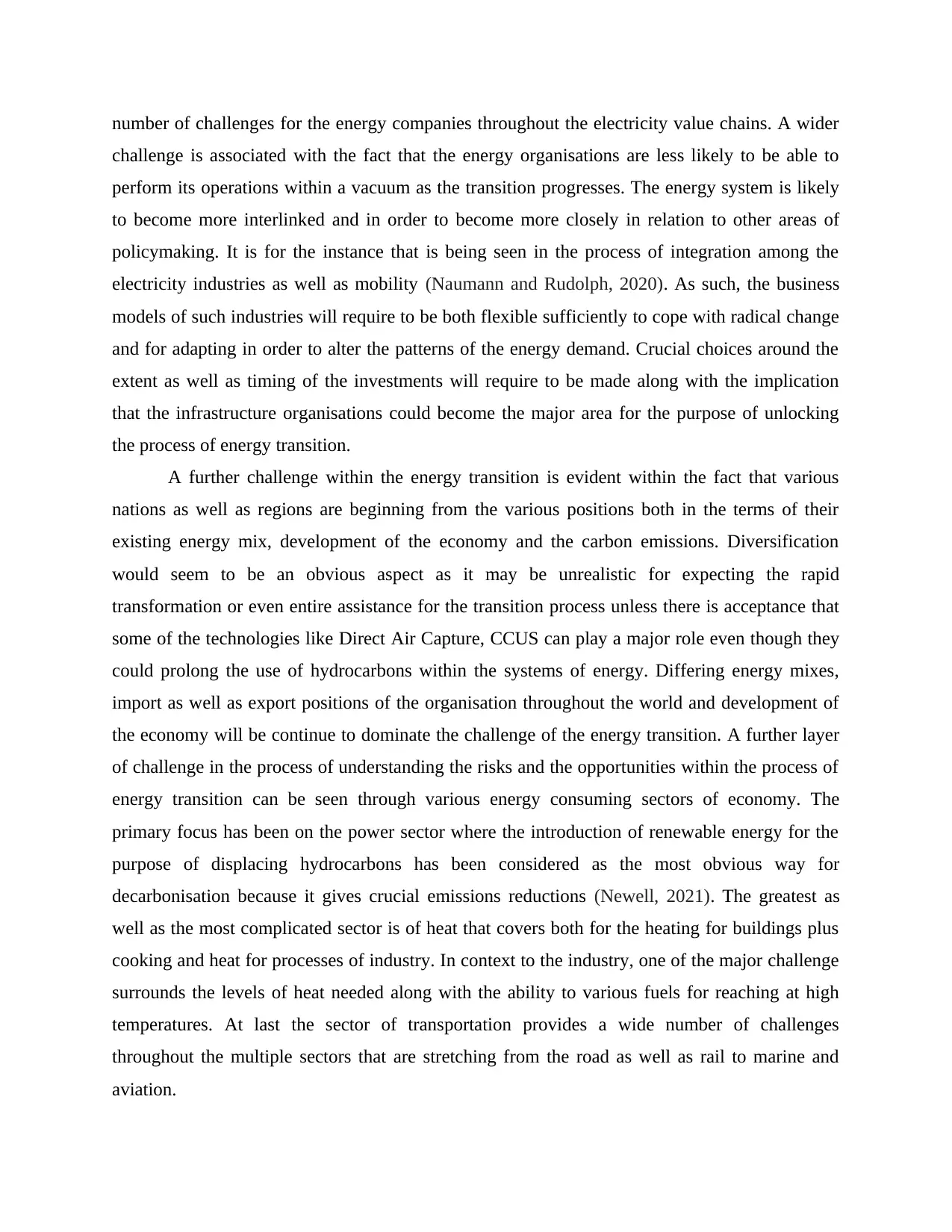
number of challenges for the energy companies throughout the electricity value chains. A wider
challenge is associated with the fact that the energy organisations are less likely to be able to
perform its operations within a vacuum as the transition progresses. The energy system is likely
to become more interlinked and in order to become more closely in relation to other areas of
policymaking. It is for the instance that is being seen in the process of integration among the
electricity industries as well as mobility (Naumann and Rudolph, 2020). As such, the business
models of such industries will require to be both flexible sufficiently to cope with radical change
and for adapting in order to alter the patterns of the energy demand. Crucial choices around the
extent as well as timing of the investments will require to be made along with the implication
that the infrastructure organisations could become the major area for the purpose of unlocking
the process of energy transition.
A further challenge within the energy transition is evident within the fact that various
nations as well as regions are beginning from the various positions both in the terms of their
existing energy mix, development of the economy and the carbon emissions. Diversification
would seem to be an obvious aspect as it may be unrealistic for expecting the rapid
transformation or even entire assistance for the transition process unless there is acceptance that
some of the technologies like Direct Air Capture, CCUS can play a major role even though they
could prolong the use of hydrocarbons within the systems of energy. Differing energy mixes,
import as well as export positions of the organisation throughout the world and development of
the economy will be continue to dominate the challenge of the energy transition. A further layer
of challenge in the process of understanding the risks and the opportunities within the process of
energy transition can be seen through various energy consuming sectors of economy. The
primary focus has been on the power sector where the introduction of renewable energy for the
purpose of displacing hydrocarbons has been considered as the most obvious way for
decarbonisation because it gives crucial emissions reductions (Newell, 2021). The greatest as
well as the most complicated sector is of heat that covers both for the heating for buildings plus
cooking and heat for processes of industry. In context to the industry, one of the major challenge
surrounds the levels of heat needed along with the ability to various fuels for reaching at high
temperatures. At last the sector of transportation provides a wide number of challenges
throughout the multiple sectors that are stretching from the road as well as rail to marine and
aviation.
challenge is associated with the fact that the energy organisations are less likely to be able to
perform its operations within a vacuum as the transition progresses. The energy system is likely
to become more interlinked and in order to become more closely in relation to other areas of
policymaking. It is for the instance that is being seen in the process of integration among the
electricity industries as well as mobility (Naumann and Rudolph, 2020). As such, the business
models of such industries will require to be both flexible sufficiently to cope with radical change
and for adapting in order to alter the patterns of the energy demand. Crucial choices around the
extent as well as timing of the investments will require to be made along with the implication
that the infrastructure organisations could become the major area for the purpose of unlocking
the process of energy transition.
A further challenge within the energy transition is evident within the fact that various
nations as well as regions are beginning from the various positions both in the terms of their
existing energy mix, development of the economy and the carbon emissions. Diversification
would seem to be an obvious aspect as it may be unrealistic for expecting the rapid
transformation or even entire assistance for the transition process unless there is acceptance that
some of the technologies like Direct Air Capture, CCUS can play a major role even though they
could prolong the use of hydrocarbons within the systems of energy. Differing energy mixes,
import as well as export positions of the organisation throughout the world and development of
the economy will be continue to dominate the challenge of the energy transition. A further layer
of challenge in the process of understanding the risks and the opportunities within the process of
energy transition can be seen through various energy consuming sectors of economy. The
primary focus has been on the power sector where the introduction of renewable energy for the
purpose of displacing hydrocarbons has been considered as the most obvious way for
decarbonisation because it gives crucial emissions reductions (Newell, 2021). The greatest as
well as the most complicated sector is of heat that covers both for the heating for buildings plus
cooking and heat for processes of industry. In context to the industry, one of the major challenge
surrounds the levels of heat needed along with the ability to various fuels for reaching at high
temperatures. At last the sector of transportation provides a wide number of challenges
throughout the multiple sectors that are stretching from the road as well as rail to marine and
aviation.
Paraphrase This Document
Need a fresh take? Get an instant paraphrase of this document with our AI Paraphraser
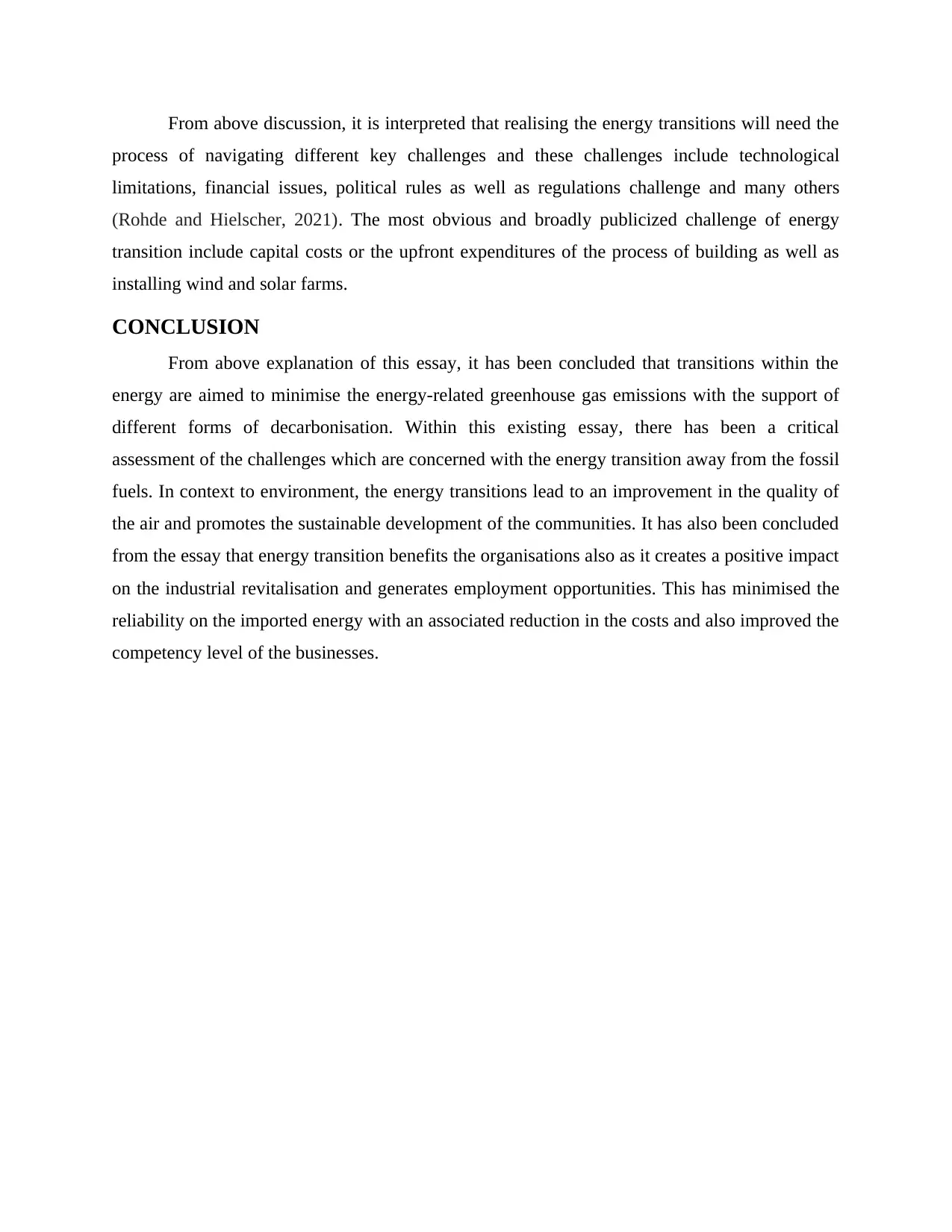
From above discussion, it is interpreted that realising the energy transitions will need the
process of navigating different key challenges and these challenges include technological
limitations, financial issues, political rules as well as regulations challenge and many others
(Rohde and Hielscher, 2021). The most obvious and broadly publicized challenge of energy
transition include capital costs or the upfront expenditures of the process of building as well as
installing wind and solar farms.
CONCLUSION
From above explanation of this essay, it has been concluded that transitions within the
energy are aimed to minimise the energy-related greenhouse gas emissions with the support of
different forms of decarbonisation. Within this existing essay, there has been a critical
assessment of the challenges which are concerned with the energy transition away from the fossil
fuels. In context to environment, the energy transitions lead to an improvement in the quality of
the air and promotes the sustainable development of the communities. It has also been concluded
from the essay that energy transition benefits the organisations also as it creates a positive impact
on the industrial revitalisation and generates employment opportunities. This has minimised the
reliability on the imported energy with an associated reduction in the costs and also improved the
competency level of the businesses.
process of navigating different key challenges and these challenges include technological
limitations, financial issues, political rules as well as regulations challenge and many others
(Rohde and Hielscher, 2021). The most obvious and broadly publicized challenge of energy
transition include capital costs or the upfront expenditures of the process of building as well as
installing wind and solar farms.
CONCLUSION
From above explanation of this essay, it has been concluded that transitions within the
energy are aimed to minimise the energy-related greenhouse gas emissions with the support of
different forms of decarbonisation. Within this existing essay, there has been a critical
assessment of the challenges which are concerned with the energy transition away from the fossil
fuels. In context to environment, the energy transitions lead to an improvement in the quality of
the air and promotes the sustainable development of the communities. It has also been concluded
from the essay that energy transition benefits the organisations also as it creates a positive impact
on the industrial revitalisation and generates employment opportunities. This has minimised the
reliability on the imported energy with an associated reduction in the costs and also improved the
competency level of the businesses.
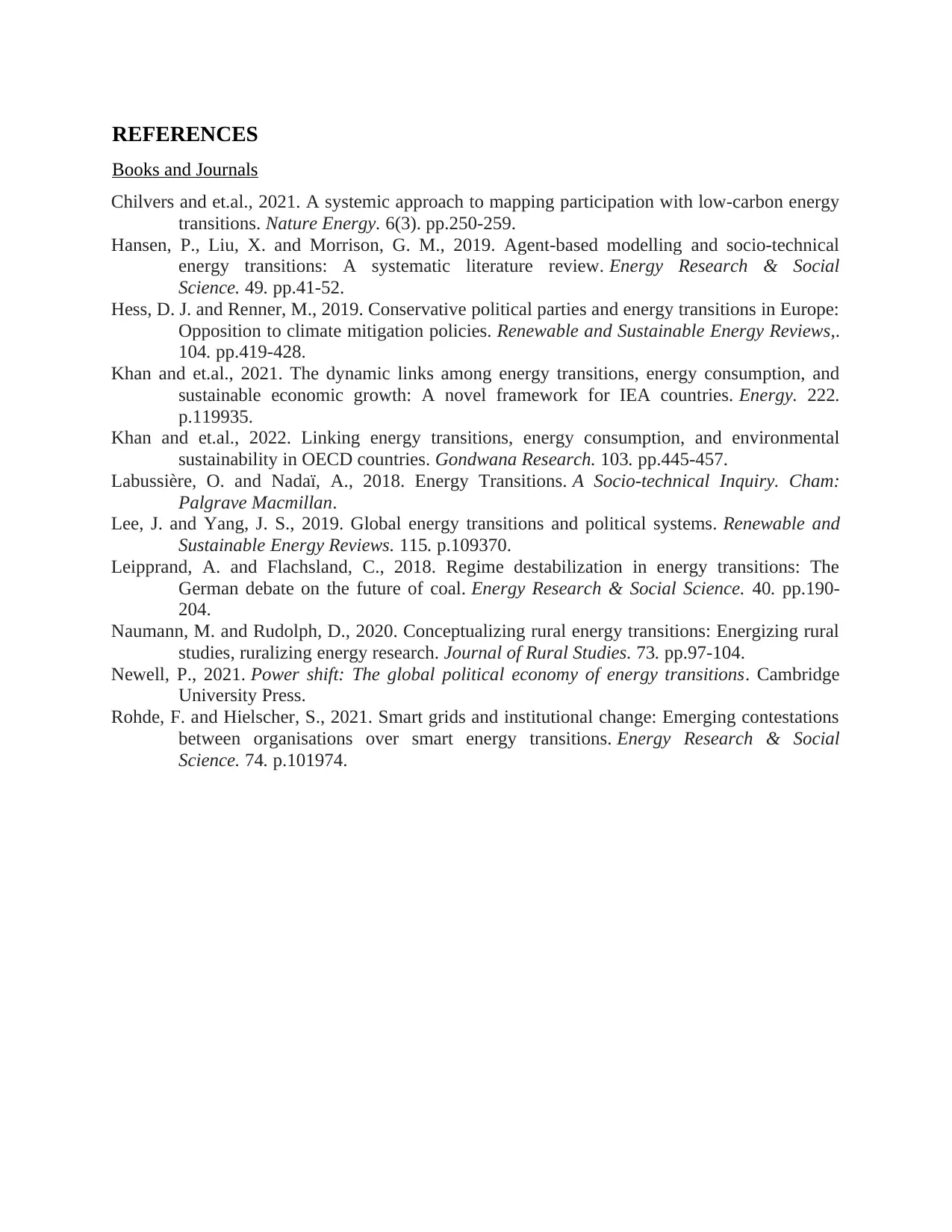
REFERENCES
Books and Journals
Chilvers and et.al., 2021. A systemic approach to mapping participation with low-carbon energy
transitions. Nature Energy. 6(3). pp.250-259.
Hansen, P., Liu, X. and Morrison, G. M., 2019. Agent-based modelling and socio-technical
energy transitions: A systematic literature review. Energy Research & Social
Science. 49. pp.41-52.
Hess, D. J. and Renner, M., 2019. Conservative political parties and energy transitions in Europe:
Opposition to climate mitigation policies. Renewable and Sustainable Energy Reviews,.
104. pp.419-428.
Khan and et.al., 2021. The dynamic links among energy transitions, energy consumption, and
sustainable economic growth: A novel framework for IEA countries. Energy. 222.
p.119935.
Khan and et.al., 2022. Linking energy transitions, energy consumption, and environmental
sustainability in OECD countries. Gondwana Research. 103. pp.445-457.
Labussière, O. and Nadaï, A., 2018. Energy Transitions. A Socio-technical Inquiry. Cham:
Palgrave Macmillan.
Lee, J. and Yang, J. S., 2019. Global energy transitions and political systems. Renewable and
Sustainable Energy Reviews. 115. p.109370.
Leipprand, A. and Flachsland, C., 2018. Regime destabilization in energy transitions: The
German debate on the future of coal. Energy Research & Social Science. 40. pp.190-
204.
Naumann, M. and Rudolph, D., 2020. Conceptualizing rural energy transitions: Energizing rural
studies, ruralizing energy research. Journal of Rural Studies. 73. pp.97-104.
Newell, P., 2021. Power shift: The global political economy of energy transitions. Cambridge
University Press.
Rohde, F. and Hielscher, S., 2021. Smart grids and institutional change: Emerging contestations
between organisations over smart energy transitions. Energy Research & Social
Science. 74. p.101974.
Books and Journals
Chilvers and et.al., 2021. A systemic approach to mapping participation with low-carbon energy
transitions. Nature Energy. 6(3). pp.250-259.
Hansen, P., Liu, X. and Morrison, G. M., 2019. Agent-based modelling and socio-technical
energy transitions: A systematic literature review. Energy Research & Social
Science. 49. pp.41-52.
Hess, D. J. and Renner, M., 2019. Conservative political parties and energy transitions in Europe:
Opposition to climate mitigation policies. Renewable and Sustainable Energy Reviews,.
104. pp.419-428.
Khan and et.al., 2021. The dynamic links among energy transitions, energy consumption, and
sustainable economic growth: A novel framework for IEA countries. Energy. 222.
p.119935.
Khan and et.al., 2022. Linking energy transitions, energy consumption, and environmental
sustainability in OECD countries. Gondwana Research. 103. pp.445-457.
Labussière, O. and Nadaï, A., 2018. Energy Transitions. A Socio-technical Inquiry. Cham:
Palgrave Macmillan.
Lee, J. and Yang, J. S., 2019. Global energy transitions and political systems. Renewable and
Sustainable Energy Reviews. 115. p.109370.
Leipprand, A. and Flachsland, C., 2018. Regime destabilization in energy transitions: The
German debate on the future of coal. Energy Research & Social Science. 40. pp.190-
204.
Naumann, M. and Rudolph, D., 2020. Conceptualizing rural energy transitions: Energizing rural
studies, ruralizing energy research. Journal of Rural Studies. 73. pp.97-104.
Newell, P., 2021. Power shift: The global political economy of energy transitions. Cambridge
University Press.
Rohde, F. and Hielscher, S., 2021. Smart grids and institutional change: Emerging contestations
between organisations over smart energy transitions. Energy Research & Social
Science. 74. p.101974.
⊘ This is a preview!⊘
Do you want full access?
Subscribe today to unlock all pages.

Trusted by 1+ million students worldwide
1 out of 9
Related Documents
Your All-in-One AI-Powered Toolkit for Academic Success.
+13062052269
info@desklib.com
Available 24*7 on WhatsApp / Email
![[object Object]](/_next/static/media/star-bottom.7253800d.svg)
Unlock your academic potential
Copyright © 2020–2026 A2Z Services. All Rights Reserved. Developed and managed by ZUCOL.




